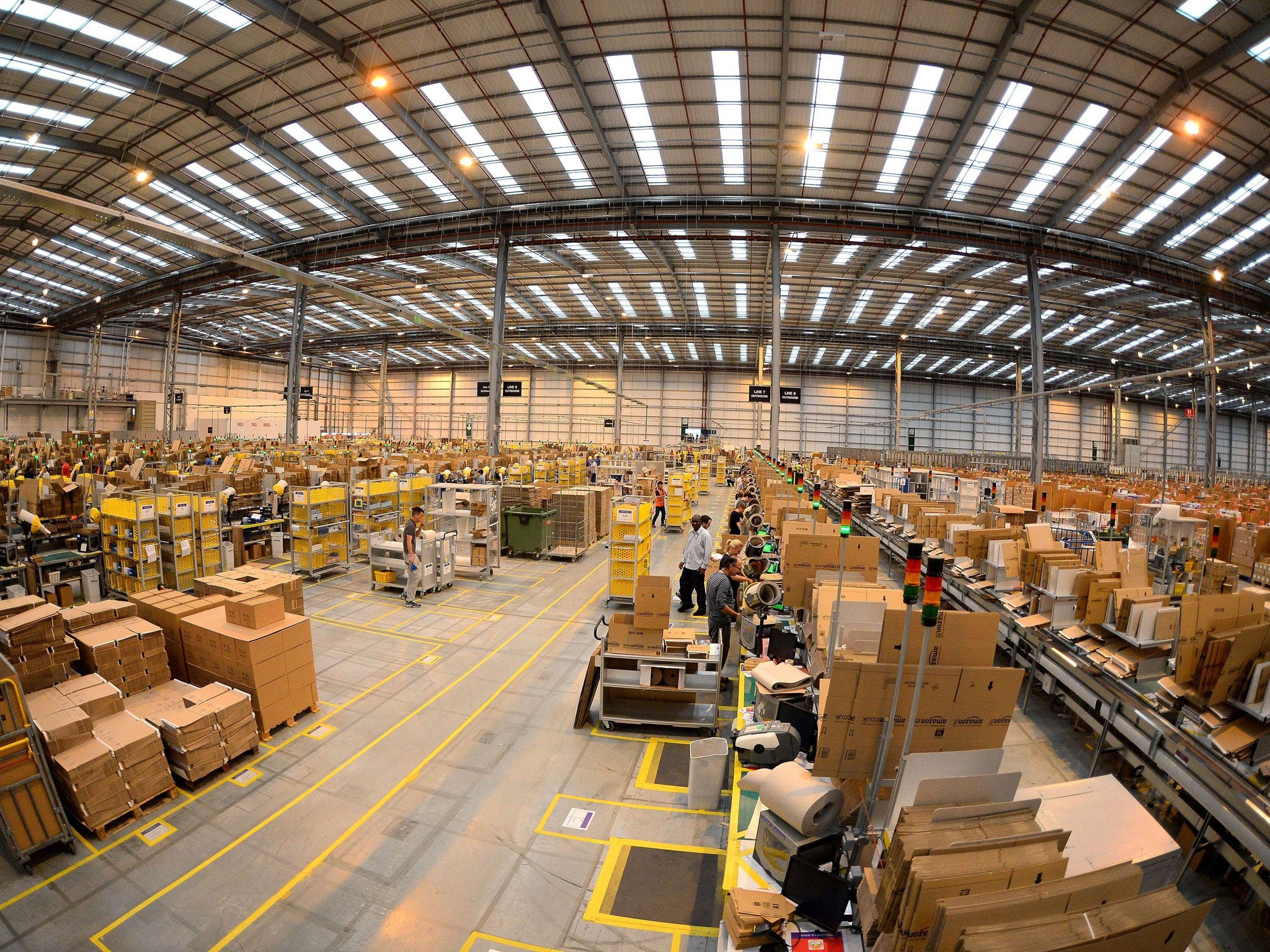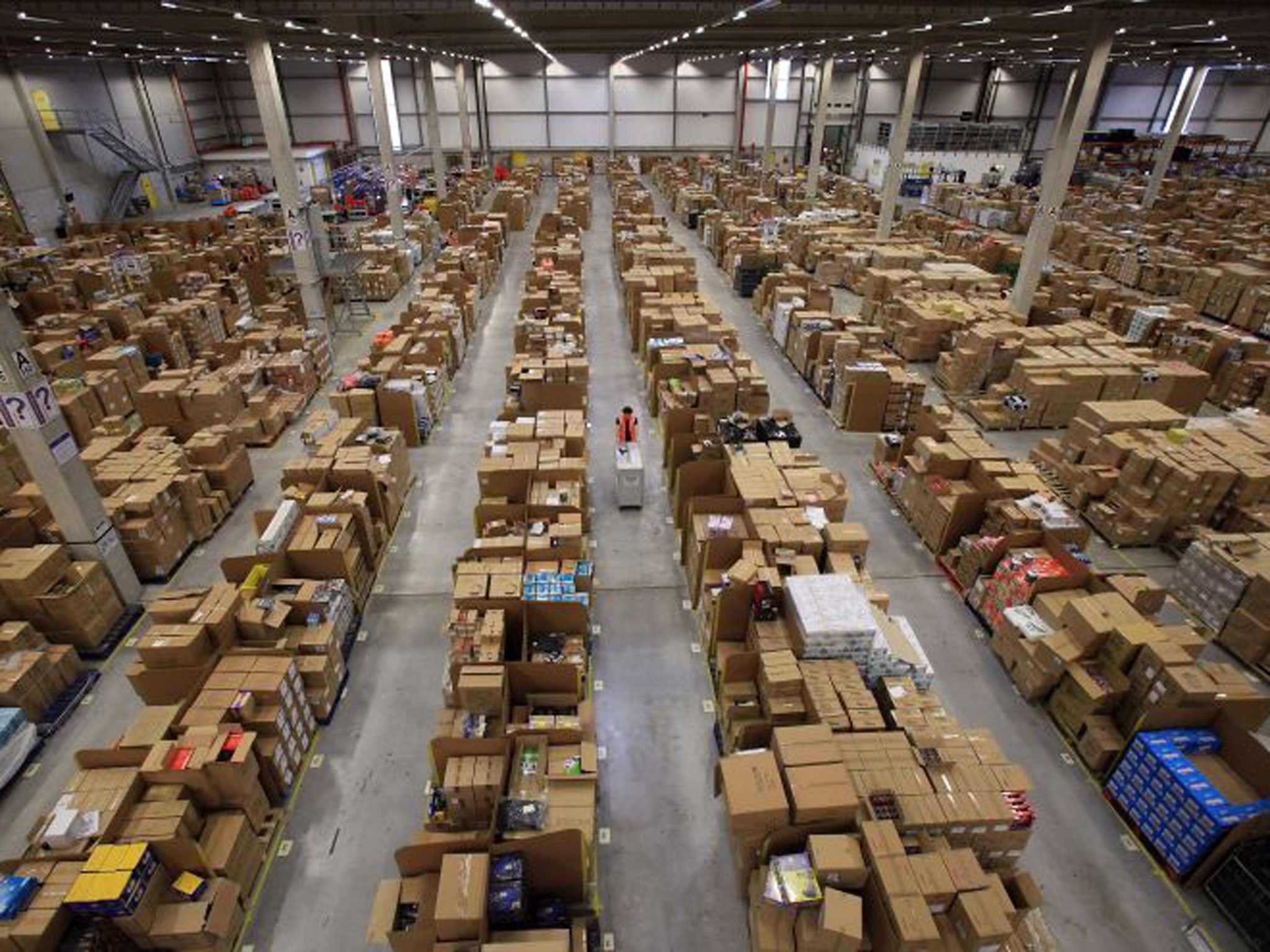Tougher times for Amazon as rivals get smart
With traditional retailers raising their game, the online giant has seen a slowdown in UK growth

Your support helps us to tell the story
From reproductive rights to climate change to Big Tech, The Independent is on the ground when the story is developing. Whether it's investigating the financials of Elon Musk's pro-Trump PAC or producing our latest documentary, 'The A Word', which shines a light on the American women fighting for reproductive rights, we know how important it is to parse out the facts from the messaging.
At such a critical moment in US history, we need reporters on the ground. Your donation allows us to keep sending journalists to speak to both sides of the story.
The Independent is trusted by Americans across the entire political spectrum. And unlike many other quality news outlets, we choose not to lock Americans out of our reporting and analysis with paywalls. We believe quality journalism should be available to everyone, paid for by those who can afford it.
Your support makes all the difference.Amazon founder Jeff Bezos does not care about profits. He is notorious for running the online giant at close to break-even margins.
Instead, hard-driving Mr Bezos is obsessed by sales as he aims to grab market share in his quest to make Amazon the biggest retailer in the world. So he and his senior lieutenants pore over turnover figures on a weekly basis.
“This is what, for employees, is so absolutely scary and impressive about the executive team,” Dave Cotter, a former Amazon executive, told Mr Bezos’s biographer, Brad Stone, author of The Everything Store, last year. “They force you to look at the numbers and answer every question about why specific things happened.”
So as Amazon marks its 20th anniversary this year, Mr Bezos is unlikely to have been thrilled with the company’s performance in the UK, where sales growth has been slowing. Turnover in Britain rose only 12.6 per cent to $7.29 bn (£4.5bn) last year, according to accounts filed by the US parent company, while the group as a whole increased sales by 24 per cent to $74.5bn.
Revenues rose $800m on a year earlier in Britain, Amazon’s fourth-biggest market after America, Germany and Japan. That compares with a rise of $1bn to $6.48bn in 2012 and by $1.4 bn to $5.35bn in 2011. Taking into account changes to the dollar-sterling exchange rate, UK growth is estimated at 14 per cent last year on a like-for-like basis, down from 22 per cent in 2012 and 31 per cent in 2011.
Amazon declined to comment. But analysts said it has been feeling the squeeze in Britain for a number of reasons:
First, traditional players such as John Lewis and Dixons raised their game – particularly with “click and collect” services. Independent retail analyst Nick Bubb cites John Lewis’s use of its sister food chain, Waitrose, as a “physical” collection point for web purchases as an example of how established chains are finally starting to act smarter. Amazon lacks its own network of physical stores, although it has begun offering a click-and-collect service by opening “lockers” in selected sites.

A second problem is that competition is hotting up in electricals – an important market for the maker of the Kindle e-reader. Dixons’ decision to match Amazon on price shows the US giant is no longer finding it so easy to undercut rivals, says Mr Bubb.
A third issue is changing habits when it comes to media consumption.
“What has been a drag is the books and entertainment market is pretty mature,” adds Mr Bubb, who reckons falling CD sales and other traditional entertainment products – once at the heart of Amazon’s business – have pushed down on revenues. This is not just a trend confined to the UK. Amazon’s international sales of “media” products rose just 1 per cent last year.
One unknown is whether the corporate tax-avoidance row that blew up in autumn 2012 has had an impact on Amazon’s reputation. There is anecdotal evidence that some ethically minded Britons stopped using Amazon after the Commons Public Accounts Committee blasted the way sales are processed in Luxembourg to avoid UK tax, even though the web giant has eight distribution centres in Britain, employing up to 8,000 permanent staff and 15,000 temporary “associates” at Christmas. The latest UK accounts show it paid just £2.4m in corporation tax in Britain in 2012.

However, Mr Bubb believes that most of Amazon’s critics just “hold their nose” and continue shopping because it is reliable and competitively priced – just as they keep searching on Google and connecting with friends on Facebook despite similar accusations. Tax is only paid on profits and Mr Bezos’s tactic of operating Amazon at ultra-low margins – it made a profit of just $274m globally last year – means it would only ever pay a small amount of tax.
A fascinating bigger question is whether Amazon has peaked. Fourth-quarter results disappointed Wall Street analysts and there is some suggestion that Mr Bezos, 50, has his eye on other things, after buying the Washington Post and investing in philanthropic ventures through his Bezos Expeditions arm.
But Mr Stone’s book suggests Mr Bezos remains focused on making Amazon a $200bn-a-year company. Ecommerce remains fast-growing with analyst firm eMarketer estimating the global market will increase 20 per cent this year to reach $1.5 trn.
Amazon is pushing into fresh food on the West Coast of America (though not yet in Britain) and has branched out into clothes and men’s grooming products in Britain. Then there has been the launch of Sunday deliveries. Same-day delivery is the next big target – hence Mr Bezos’s claim that Amazon is planning to use remote-controlled drones. Beyond retail, there is Amazon Web Services, a huge business that provides cloud-computing and storage services for countless companies.
The problem for Amazon, in Mr Bubb’s words, is that “mathematically, arithmetically, it gets harder to keep growing”.
Retail challenges: growing competition
Amazon may be the biggest online retailer but it faces growing competition from established British supermarkets, even though the US giant isn’t involved in fresh food – yet.
In electricals, Dixons and John Lewis have both raised their game. Meanwhile, Tesco’s successful launch of its own-brand, low-cost Hudl tablet and the expansion of its TV-and-film streaming service Blinkbox are aimed at Amazon’s Kindle Fire tablet and LoveFilm movie service.
Observers doubt Amazon will enter groceries in the UK because it is ultra-competitive. However, other British grocers could follow Tesco’s lead by entering Amazon’s home turf of electricals and media. Online retailer Ocado, for example, could become a serious force, after confounding stock-market doubters in a tie-up with Morrisons.
The Holy Grail in retail is now seen as “multichannel”, combining a strong online and mobile presence with a network of physical stores.
Join our commenting forum
Join thought-provoking conversations, follow other Independent readers and see their replies
Comments